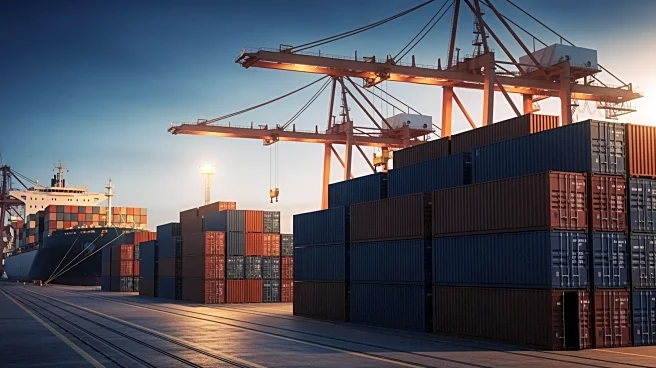What's Happening?
The Port of Houston is experiencing significant disruptions due to the combination of rising tariffs and a prolonged government shutdown. Customs officers, deemed essential workers, continue to work without
pay, affecting the processing of goods. The port, which handles more exports by total value than any other U.S. port, is crucial for Texas-based manufacturing, supporting over 3 million jobs nationwide. However, delays in processing imports, exacerbated by the Trump administration's tariffs, are causing uncertainty for companies relying on the port. Texas Senator John Cornyn has expressed support for the tariffs, citing concerns over supply chain dependencies on countries like China. Meanwhile, regional companies are reconsidering investments due to increased raw material costs, and retaliatory tariffs from other countries are impacting exports, notably liquefied natural gas.
Why It's Important?
The disruptions at the Port of Houston have broader implications for the U.S. economy, particularly affecting industries reliant on international trade. The tariffs and shutdown could lead to increased costs and delays, impacting manufacturing and export sectors. As companies face higher input costs and potential job losses, the economic ripple effects could extend beyond Texas, affecting national trade dynamics. The situation underscores the delicate balance between trade policies and economic stability, with potential long-term consequences for U.S. competitiveness in global markets.
What's Next?
The ongoing government shutdown and tariff disputes may lead to further delays and economic strain. The U.S. Supreme Court is set to hear arguments challenging the legality of the tariffs in November, which could influence future trade policies. Stakeholders, including businesses and policymakers, will need to navigate these challenges to mitigate economic impacts and ensure the stability of trade operations at the Port of Houston and beyond.
Beyond the Headlines
The situation at the Port of Houston highlights the complex interplay between government policy and economic realities. The ethical and legal dimensions of imposing tariffs and the responsibilities of essential workers during a shutdown raise questions about governance and economic justice. Long-term shifts in trade relationships and supply chain strategies may emerge as companies adapt to new economic conditions.








